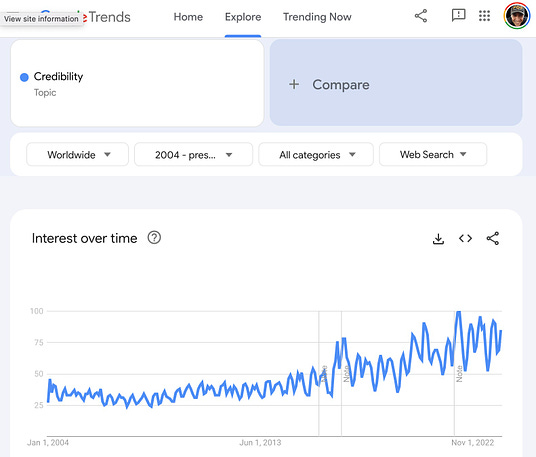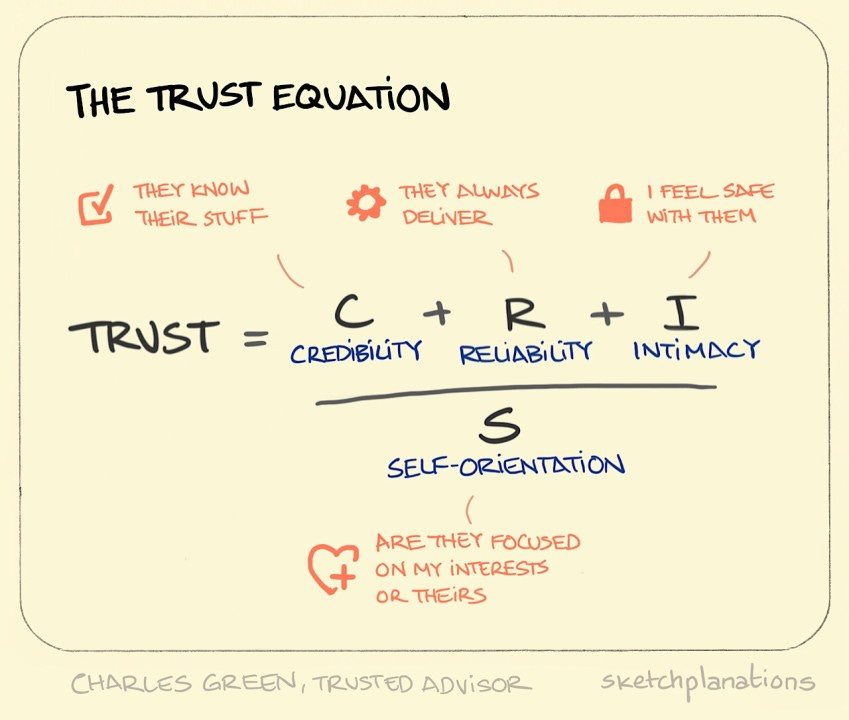Hello,
welcome to this new edition of TRUST-able.
Trust is a rare and precious asset, hard to obtain and very easy to lose.
Online it is even more important than in real-life because online no-one can see you face-to-face and it is much harder to determine whether your business is reliable, credible, and truly interested in serving your needs.
In this context, credibility plays a critical role, acting as a proxy for your presence, experience and dedication, and facilitating the process of trust building with those who discover you online.
Unless one understands how credibility is generated and which are the factors that impact it the most (both positively and negatively), it may become very difficult to maintain competitiveness amidst a growing number of competitors.
Robin Good
How to build trust through credibility.
What Is Credibility
Etymology of the Word
.
Why Credibility Is So Important
(for an online entrepreneur)
Credibility Scorecard
(How credible are you from 0 to 100)
Low Online Credibility Symptoms
(How not-credible are you?)
.
Top Credibility Builders
.
Credibility Resources To Dive Deeper
20+ Non-Obvious Ways To Gain Credibility
(for Premium readers)
.
Credibility refers to the characteristic of being convincing, reliable and worthy of trust in the eyes of others.
.
Credibility is about showcasing practical (not just theoretical) expertise and real contributions your area of expertise without using evident self-promotion. At the same time building credibility often requires more than just showcasing expertise or accomplishments.
.
Credibility is most often established through qualifications, experience, track record, endorsements, and validation from peers or stakeholders but there are many other ways to establish it and consolidate it.
.
Credibility focuses on the belief or truthfulness of information or a source.
It asks the question: "Is this source of information believable?"
.
Credibility is evaluated on factors such as expertise, credentials, reputation, accuracy, consistency and alignment with audience expectations or standards.
.
“To be credible” in the context of online entrepreneurship means being perceived as a reliable and authoritative information source in a specific domain.
.
Trustworthiness pertains more to personal integrity and ethical conduct, whereas credibility relates to perceived expertise, reliability, and believability in specific domains or contexts.
According to the Trust Equation Formula, presented in “The Trusted Advisor” book by Charles H. Green and David H. Meister, credibility is a key strategic element in building trust.
Reminder: The Trust Equation is a model describing the key components that influence trust in business relationships or any context where trust is essential.
The equation has four variables:
Credibility (C):
How believable are your words and expertise?
Reliability (R): Do you consistently follow through on promises and actions?
Intimacy (I): How safe or comfortable does the other person feel sharing information with you?
Self-orientation (S): How focused are you on yourself vs. having a genuine interest in the other person?
The equation is represented as:
An increase in perceived credibility directly increases trust. If people don't believe you're knowledgeable or capable, trust suffers.
Please Note:
A highly self-oriented person (focused more on his own needs than the ones of his customers) will inspire less trust.
Credibility helps to offset the negative impact of those who tend to have a high self-orientation.
Alone, credibility is insufficient to gain maximum trust.
Credibility needs to be coupled with high reliability and intimacy and low self-orientation.
The word "credibility" traces its origins back to the Latin term "credibilis," which is derived from the verb "credere," meaning "to believe" or "to trust."
In Latin, "credibilis" means something:
The Latin root "credere" itself is a combination of "cor" (meaning "heart") and "dare" (meaning "to give"). Therefore, the concept of credibility in its linguistic roots suggests the act of giving one's heart or trust to something or someone.
Over time, as Latin evolved into various Romance languages, the term "credibilis" transformed into words like "crédibilité" in French, "credibilidad" in Spanish, and "credibilità" in Italian, all carrying similar meanings related to trustworthiness and believability.
In English, the word "credibility" emerged in the 16th century. The first recorded use of the word dates back to the 1590s, appearing in the writings of religious reformer John Knox, where it retained its fundamental meaning of being believable, trustworthy, or reliable.
In synthesis, the history of the word "credibility":
highlights the intrinsic connection between trust, belief, and the quality of being able to inspire confidence or acceptance in what is said, done, or presented.
The main benefits that make Credibility a key strategic asset are the following:
.
In the online world, consumers lack the ability to physically interact with businesses and assess them in person. This creates uncertainty and potential risks when making purchasing decisions. High credibility mitigates this risk by signaling trustworthiness and reliability.
Online consumers are bombarded with information and marketing messages, making them wary of scams and deceptive practices. High credibility establishes a sense of transparency and accountability, fostering trust and encouraging customers to engage with the business.
Businesses which are highly credible are more likely to be recommended by satisfied customers because customers feel greater satisfaction when served by someone competent, consistent and who truly cares for them. In turn they get motivated to post positive online reviews, leading to increased visibility and brand awareness.
Customers who perceive a business as credible are more likely to return for repeat purchases and to spontaneously recommend it to their friends and contacts because they rate credible businesses with superior value compared to others.
By establishing credibility, online entrepreneurs can overcome the limits imposed by physical distance that make it difficult to assess the competence and trustworthiness of someone we cannot see or talk to directly. The more credible a business appears and the less obstacles there are to develop and sustain a trusted communication channel.
As I was writing this Credibility issue, I asked myself many times how I do normally judge the credibility of people I serve, work with or meet informally outside work. And as criteria came up from memory, I started to compile a list.
This is how I came up with the Good Scorecard. Consider it my personal, credibility evaluation system. It’s based on my experience, culture and on the context / industry in which I operate.
The Good Scorecard may not be applicable to you or to your situation, but it can be an inspiring starting point on the path to better understand how others judge your own credibility.
.
How to use it.
Check each of the credibility factors listed below, and score points for each one that is already a reality in your professional life. Make a total of the points accumulated and see what “scorecard results” section says.
Published books [15 pts.]
Writing and publishing books on your topic of expertise guarantees a significant boost in credibility.
.
Citations [10]
Being mentioned inside books, podcasts or articles by authors in your industry can positively impact your credibility. Facilitate such occurrences by doing personal outreach, interviews with experts, publishing unique research, mapping the territory or creating public courses on specific topics.
.
Proof of work [10]
Showcase of milestone work you have produced in your area of expertise
with detailed information about project scope, date, your role, results achieved, images, reference links, reviews and more.
.
Personal profile page with all your info [5]
Personal story
Professional credentials
Focus areas, expertise, skills
Updated within a year
All in one place
.
Contact-ability [5]
Multiple simple ways to contact you
.
Testimonials [5]
Public reviews of your work by customers and industry experts
Must include name and last name
.
Speaking at Events [5]
Presenting at public events, conferences and online conferences.
.
Interviews [5]
Published interviews with you.
.
Social media active (or closed) [5]
On this front the decision is simple: be present or exit. Maintaining open social media channels curated by bots, or updated once in a while with little or no engagement, is not a good idea. Unless such channels are closed they will certainly dent your credibility as people seeing your content there with next to zero engagement will assume you are of no interest.
.
Frequency / recency of publishing [5]
Publishing frequently sends the message that you are an active and credible source. This is in contrast with those personalities and websites where it is hard to tell whether you are looking at someone who was last active 5 years ago, or at someone who is alive and kicking now.
.
Transparency [5]
Listing your effective years of experience, earnings, failures, name of clients, and other similar data helps you appear more transparent and thus more credible.
.
Official achievements [5]
Showcasing your key achievements, certificates, degrees and awards without showing off, helps confirm and consolidate your perceived credibility level.
.
Full guarantee [5]
Make sure your product / service is above average. Back your offerings with the highest level of guarantee you can offer. 100% happy or fully reimbursed. Make this a marketing cost. Do not worry about people exploiting it to get things from you for free. Instead make sure that every possible reimbursement request allows you to get a good peek inside at what they did not like or would have changed, added, improved.
.
Publicly showing:
Academic Credentials [2]
Membership in Professional Associations [2]
Years of experience [2]
Professional Title [1]
.
80 points or more: Trustable - Highly credible.
You appear to be a very credible professional. There is little doubt that you know what you are talking about and that you are a well recognized and respected expert in your field.
.
Between 55 and 80 points: Above average credibility.
You have many factors showing that you are a credible professional. You also have great margins for further improvement.
.
Below 55 points: Low credibility level.
If your sales are not growing, you may want to consider investing time in the credibility areas that you have developed the least.
Here I have worked to identify, relying again solely on my personal experience, which are the key negative factors that have the greatest impact on my perception of how credible a online professional is (no matter whether he is a client, partner, team-worker, supplier or potential friend) .
I have ordered them here below in order of importance.
.
Inconsistency
Public projects started and stopped (newsletter, podcast, blogs, podcasts, etc.). Long and inconsistent pauses between posts, new issues or episodes.
.
Self-Orientation
Tends to highlight, praise, self-celebrate his skills and abilities, as well as his successes, not the ones made by others. Often use the terms “me”, “mine” and “I”s.
.
Profit Focus
First and highest priority is increasing revenue. Not “being of service”.
The focus is on profit instead of being on a cause, ideal, issue/problem.
.
Lack of Work Proofs
Little or no public proof that shows how good one is at what he claims to be an expert of.
.
No Valuable Resources
Little or no unique high-value published content like catalogs, directories, in-depth guides, courses, reports, case studies, example showcases, interviews, toolkits.
.
Shallowness
Generally shallow content. In line with average online article. Little outlinking to multiple authoritative sources in his field.
.
No Voice
Lack of an authentic voice, viewpoint, opinion, perspective. Everything on the site is professionally written but there’s no unique character, voice and viewpoint that come through.
.
Outdated Site and Info
Website/blog not up-to-date. Old copyright date, outdated information on the person and his projects.
.
Badly Organized Website
It’s not easy to have a comprehensive and simple-to-understand view of endeavours, projects, skills and offers by navigating his home page.
.
Low Legibility
The content published is badly formatted, organized, presented. Lots of information crowded in a little space. Typical fails: Characters too small, excessive “line length”, very long paragraphs, section and titles not properly distanced, “distractions” all around your content. Overall things don’t look “designed” by a professional, but amassed there without much care for how they appear, are ordered and how legible they are.
.
Abandoned Social Media
Channels left open but with no updates in months/years. No last post signaling where the author is now hanging out online.
.
Lack of Personal Branding
Little or no care for logo, branding, signature, email address and other related elements.
.
Missing Contact Points
It’s not easy to find out how to contact the person directly.
.
Excessive Social Promiscuity
Nearly as many or more people followed than the ones following. Low engagement (under 1%).
On the other hand if you were to ask me which critical elements I would recommend to any of my customers to rapidly build-up their credibility (online and off), these are the aspects I would suggest them to focus on:
.
Being at it, day in, day out, like a clock, is essential to credibility-building. If you start something follow it up without interrupting or taking breaks. "Leaders earn their credibility by being consistent in their words and actions." (James C. Hunter)
.
When you communicate or take an assignment, follow it up. Don’t drop it until the other party wakes you up asking what has happened. Keep the task and projects you’re following under tabs or it will be hard - no matter how generous and good-willed you are - to make others perceive you as a credible professional.
.
Show how good you are, don’t hide the proofs. Make your best work visible, easy to find and well documented so that people can see and appreciate without filters what you can actually do. Show the results you have achieved helping people solve the problem for which you claim to be an expert.
.
Learn to pay great attention to details. Notice and correct little errors, typos, small things that are incorrect or out of place. Attention to details communicates care and professionalism, two fundamental elements to appear credible. Spot and correct details that affect “instant credibility” online (on your website, emails, signature, posts, etc.) as well as in real life.
.
Teach what you know. Create an online course. Keep on studying. Don’t sit on your laurels. Keep increasing your expertise by challenging yourself with new ambitious projects that push the limits of what you know, allow you to master what you have been studying and build your credibility in the eyes of your audience.
.
Present yourself in a professional way, both online and in person. Online make sure your site looks orderly, up-to-date and easy-to-navigate. In person show up as a slick and elegant professional leaving your desire for informality and casualness to how you speak and interact with others.
.
Flawless and perfect is 100% not credible. Being spontaneous, authentic, genuine definitely helps in transmitting a credible image. Speak like a real person, not as a professor. Write like your were speaking to a friend. Avoid plural language (we vs you guys) and stick to “I and you”.
.
Admitting to errors, recognizing mistakes and forcing oneself to apologize constructively communicate vulnerability and humility, two essential characteristics of credible people.

The more clearly you communicate, the more articulate and easy to understand you are, the more credible you will appear. Pro-actively exercise and develop this skill.
"The quality of your communication is the single biggest determinant of your credibility." Stephen Covey
A selection of the resources I have used to research and prepare this analysis.
.
by Charles H Green and David Meister
Guide for professionals seeking to build deep, trusting client relationships. It offers strategies to enhance credibility, reliability, intimacy, and self-orientation. The book provides valuable insights for entrepreneurs looking to enhance client trust.
by Cara Hale Alter
- Develop confidence through preparation, self-care
- Improve communication via storytelling and listening
- Show accountability, integrity, grace under pressure
- Make connections by understanding motivations
- Structure competencies across 4 key dimensions
by Debbie Allen
Strategies to establish yourself as an expert in your field in order to attract more high-paying clients.
by John Weiler
Seemingly small elements like grammar, contact forms and testimonials substantially impact visitor perceptions of credibility and willingness to engage. Trust must be earned quickly online to capture short attention spans. Implementing proven web design and content best practices can help.
by Myke Metzger
Focuses on niche identification, quantifying credibility milestones, actively collecting social proof and leveraging the validation of others. The methodology combines both developing concrete expertise and interpersonal relationship building. Credibility building is an ongoing process not a one-time accomplishment. It is made of small consistent actions over time.
.
Joel Sobel - The Review of Economic Studies,
Volume 52, Issue 4, October 1985, Pages 557–573 - 1985
Reliability can only be communicated through actions. In this context, it pays for people to build a reputation based on reliable behavior. Someone becomes credible by consistently providing accurate and valuable information or by performing useful services.
Tülin Erdem, J. Swait - 2004
Brand credibility, particularly trustworthiness, significantly influences consumer choices and brand consideration across various product categories, with higher credibility impacting choices in uncertain contexts.
Craig W. Trumbo, K. McComas - 2003
Higher credibility for industry and the state predicts lower risk perception, while low credibility for citizen groups promotes greater risk perception.
A. Gînsca, Adrian Daniel Popescu, M. Lupu - 2015
This survey highlights the importance of credibility in information retrieval, highlighting the critical role of expertise, trustworthiness, quality, and reliability.
B. Fogg - 2003
Analysis of four types of credibility: 1) presumed—general assumptions in the mind of the perceiver 2) surface—simple inspection or initial firsthand experience 3) reputed—third-party endorsements, reports, or referrals 4) earned—firsthand experience that extends over time.
Miriam J. Metzger, Andrew J. Flanagin, R. Medders - 2010
Most online users rely on others for credibility assessments and use cognitive heuristics, rather than systematically processing information, to evaluate information and sources.



